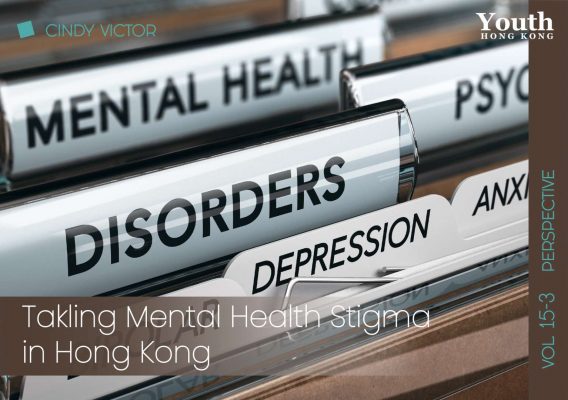//vol.15-3 Perspective
Breaking the Silence:
Tackling Mental Health Stigma in Hong Kong
by Cindy Victor
When people greet me with a simple, 「How are you doing?」 I always wonder what to say. Should I be honest and tell them how I’m really doing? Or should I resort to the customary “I’m doing fine.”
Mental health is a subject that is not widely discussed among teenagers in Hong Kong. Conversations, whether at home, in school, or in society, predominantly revolve around academic achievements, financial matters, or the latest gossip about others』 personal lives. Despite this, there has been a growing awareness of mental health issues in Hong Kong, particularly in recent years through social media platforms and online forums. Events like World Mental Health Day and mental health rallies have also contributed to this awareness.
Several non-governmental organisations (NGOs), such as The Hong Kong Federation of Youth Groups (HKFYG), are working to provide educational and recreational activities, along with counselling services. The HKFYG Wellness Mind Centre has established various teams to assist young individuals dealing with emotional health, relationship challenges, and learning difficulties. Their online youth counselling service, uTouch, offers themed activities tailored to youth-related issues.
Another noteworthy organisation is The Zubin Foundation, which focuses on creating opportunities and improving the lives of Hong Kong’s ethnic minority community. Recognising the language barriers faced by some members of this community, they established the Ethnic Minority Well-Being Centre. This centre offers free one-on-one counselling services provided by professionals fluent in languages such as Hindi, Urdu, Nepali, and English.
In addition to NGO efforts, the government has also introduced “Shall We Talk,” a website that promotes information related to mental health wellbeing and provides resources for the public. Various types of psychological services such as psychological assessments and treatments are provided through the Social Welfare Department’s clinical psychologists.
Despite these commendable efforts, mental health remains a social taboo in Hong Kong. To understand this better, let’s zoom out and view Hong Kong through a broader lens. The city’s culture is deeply rooted in its cuisine, festivals, and, interestingly, its work culture. From a young age, children and teenagers are immersed in these aspects, learning that good grades, a prestigious job, social status, and obedience to family are the keys to a fulfilling life.
But hold on, how can young individuals achieve all of this when their mental health goes unnoticed? Mental health problems can lead to a series of issues for teenagers, including difficulties in making life choices, coping with hardships, nurturing healthy relationships, and establishing appropriate boundaries. Most teenagers are so focused on their mission to achieve good grades and spend time on extra-curriculars for a good university portfolio, while neglecting their own well-being, resulting in conditions like anxiety disorders, depression, insomnia, and obsessive-compulsive disorder (OCD).
As long as mental health problems are still stigmatised in Hong Kong, and teenagers who may suspect themselves of having certain mental health conditions are discouraged from talking about their feelings, the stresses of being lonely and unvalidated only intensifies the point that their mental health is not important. By ignoring young people’s mental health, the consequences can be dire, including suicide or running away from home. Sadly, the ‘perfect lives’ depicted on social media exacerbates these issues, fostering unrealistic standards and contributing to low self-esteem.
There is very definitely a need to bring mental health stigmatisation out of the dark in Hong Kong. I believe that Gen Z can take the lead by initiating conversations about mental health and marrying the various initiatives by NGOs or the government into daily life, instead of leaving it hanging somewhere out there. I think we all understand that taking part in stress-reducing activities such as pottery classes, hiking, meditating or going for therapy sessions can also serve as valuable steps towards fostering greater mental health awareness in Hong Kong. However, what would really make a difference is to get rid of the stigma altogether.
 Cindy, 18, born and raised in Hong Kong, has just completed her DSE examinations. Interested in photography, fashion and creative writing, she is looking forward to completing her tertiary education in a field relevant to art. ■
Cindy, 18, born and raised in Hong Kong, has just completed her DSE examinations. Interested in photography, fashion and creative writing, she is looking forward to completing her tertiary education in a field relevant to art. ■


